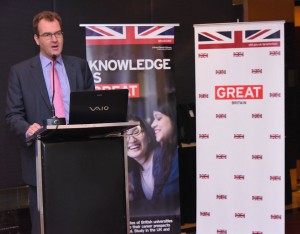
- increase visibility of UK excellence in Education,
- forge new partnerships based on mutual interest
- increase number of quality applications from Indian universities to UK funding sources
The idea to hold this session floated from our experience of working with Indian universities over the years and witnessing hundreds of niche areas for research and studies emerging rapidly. Besides, UK education has always gained positive interest from Indian institutes and universities, willing to partner with them in various capacities and collaboration opportunities- Faculty Exchange, Twinning programme, student exchange, joint researches etc.
The Roundtable was first ever activity of this kind in Northwest India wherein all the stakeholders – UK universities, Indian universities and funding bodies of UK and a state government (namely Government of Punjab) were present on a one platform.
We had divided the programme into two sessions- first session on funding opportunities and scholarships offered by the UK Government was especially designed keeping in mind the interest of Indian universities in research . The session was very well appreciated by the Deans of Research and International Relations from various universities as they were not aware of these much needed funds. Colleagues from British High Commission gave the presentations on Newton-Bhabha fund and Chevening Scholarships. The session was very well timed as Chevening have just announced their 2016-17 programme and Newton-Bhabha has many calls which are currently active.
Just to briefly highlight- The Newton-Bhabha Fund, which is a 375 Mn GBP pot, aims to bring together the UK and Indian scientific research and innovation sectors to find joint solutions to the challenges facing India in economic development and social welfare. Chevening is the UK government’s international awards scheme aimed at developing global leaders, funded by the Foreign and Commonwealth Office.
On the skills front and strengthening government to government linkages, Director Technical Education, Government of Punjab, briefed about the opportunities available with them, where UK partners and UK expertise have a role to play. It was really helpful that Sunita Kapoor, Sr Adviser Skill and Dipankar Chakraborty, Head UKTI Chandigarh were present that day to guide us further in this direction, which will be taken forward full swing.
It was really encouraging to see the large number of universities keen to participate and having received such rave reviews from all corners and on “popular demand”, this would now be followed by a session in Dehradun in February 2016 and we look forward to many more collaborations.
